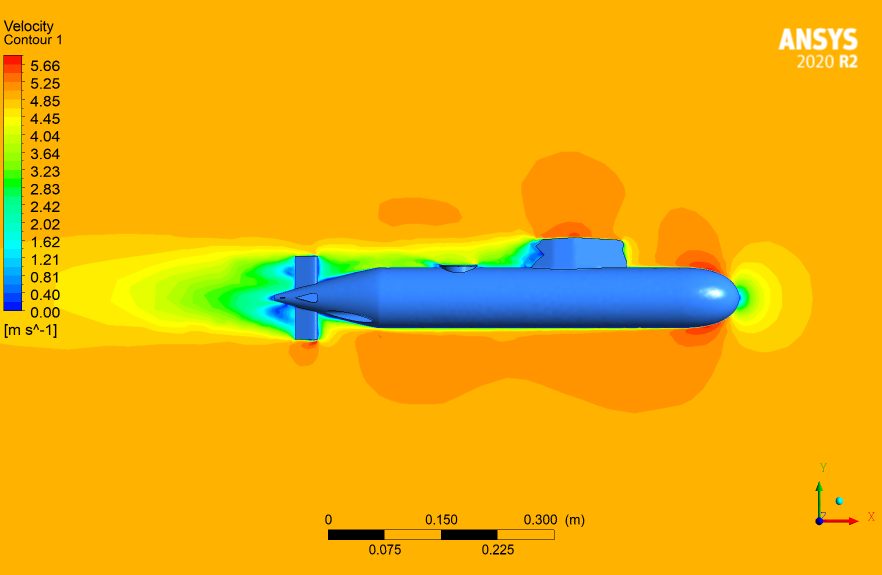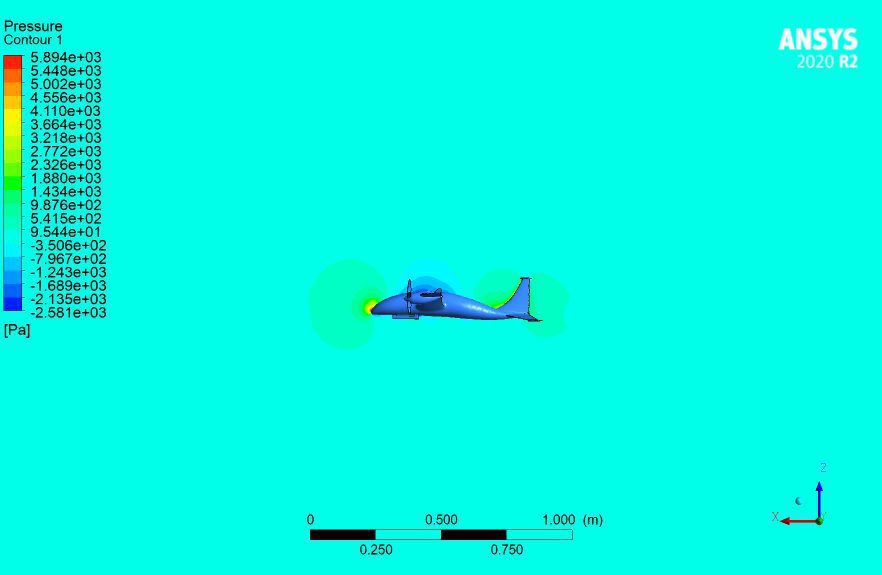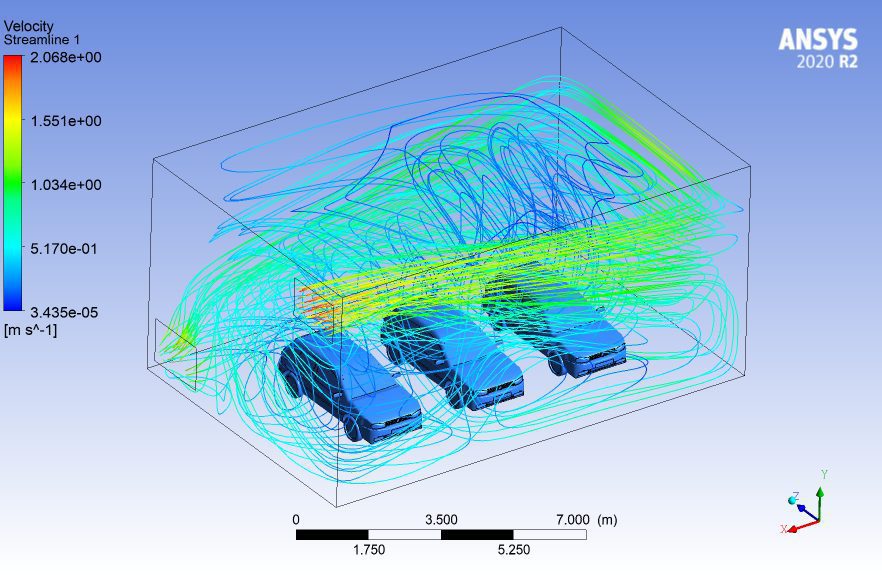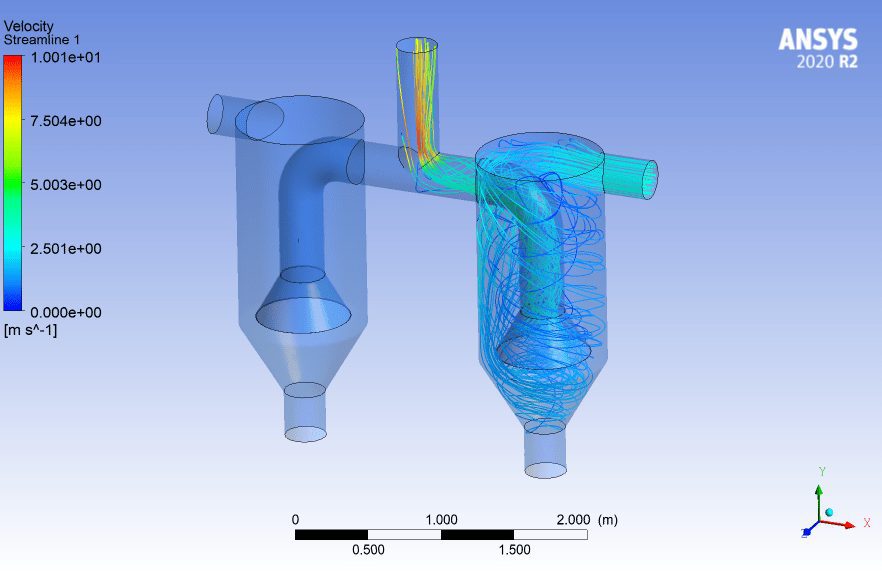CFD engineer: Are you interested in learning about the complex movement of fluids, whether it’s the flow of air around an airplane or the movement of blood in the human body? If your answer is yes, you are in the right place. Computational fluid dynamics (CFD) engineering is a fascinating discipline that allows us to simulate and analyze the behavior of fluids in various environments and various related applications. Now in this article, we will address the world of CFD engineering, the importance of That, the role of CFD engineers, required qualifications and more are among the things we will explore in this article.

Introduction to CFD Engineering
Computational fluid dynamics (CFD) engineering is a discipline that can be described intelligently as the art of simulating the movement of fluids. This method relies on advanced numerical methods and algorithms to solve advanced problems that include both liquids and gases. This field plays an important role in analyzing and predicting the behavior of fluids in different scenarios that exist. There are examples that cover a wide range of processes that are going on around us, from the air flow around a racing car. As far as blood circulation in the human body, CFD engineering allows us to gain clear insight into the complex world of fluid dynamics.
The importance of CFD engineering is widely visible in many industries. Using CFD simulation enables engineers to make informed decisions in areas such as aerodynamics, heat transfer and fluid flow. In addition to improving the overall efficiency and performance of products and systems, it also significantly reduces costs. For example, in the aviation industry, CFD plays a fundamental and essential role in aircraft design and optimization. With simulations in which engineers measure airflow over the wings and fuselage, they can reduce drag and increase fuel efficiency. This shows how practical it is and how CFD engineering is more than just an academic discipline. It is considered a practical and vital tool in the modern world.
Importance of CFD Engineering
CFD engineering is critical in the world we live in now. It is a multidisciplinary approach that allows us to explore details of fluid dynamics that are complex for us and have many applications. This field has turned from a special field of study to the cornerstone of various industries, including aerospace, automotive, energy, environmental sciences, and biomedicine. The main reason for its importance is its high ability to provide practical and novel insights into complex fluid behavior through mathematical modeling and simulation.

One of the essential fields of engineering in which CFD has made a significant and important impact is in the field of aerospace. The aviation industry relies heavily on CFD simulations to optimize aircraft design. By modeling the behavior of air around aircraft components, engineers can take advantage of this efficiency and adjust the shape of wings and fuselages to reduce drag and increase lift, leading to increased fuel efficiency and better overall performance. In addition to reducing the costs of airlines by millions of dollars, this also reduces the environmental impact of air travel. Therefore, CFD engineering directly contributes to advancements in the sustainability of various industries and applied technologies.
In the automotive sector, CFD plays an essential role in improving vehicle design. Here, simulations help manufacturers to design and produce vehicles that not only have optimal fuel consumption, but are also very compatible with the environment. These explanations include optimizing the car’s aerodynamics to reduce air resistance and reduce greenhouse gas emissions in the atmosphere. The importance of CFD in energy production sectors is also very high. From designing high-performance wind turbines to predicting oil reservoir behavior, CFD simulations help energy companies make critical decisions about their operations.
Environmental sciences also benefit greatly from CFD engineering. By simulating the dispersion of pollutants in different environments, such as the atmosphere or water flow in rivers and oceans. Environmental scientists can gain a more in-depth understanding of the behavior of natural processes. This knowledge is used to reduce the effects and losses caused by natural disasters and optimize urban planning for environmental sustainability in the face of them.
Now let’s discuss the importance of CFD engineering in the field of medicine, CFD simulations are used to study the movement of blood flow in arteries, help diagnose and treat various cardiovascular diseases. This industry is also used in drug delivery systems to ensure that drugs are released at the desired speed and location in the body.
As a result, CFD engineering is not just a discipline for a group of theorists, but a practical and indispensable tool in countless industries, some of which have been mentioned so far. This engineering science increases efficiency in various industries, reduces estimated costs, and creates innovation, making it a vital part of modern engineering and scientific endeavors.
The Role of a CFD Engineer
A CFD engineer is the behind-the-scenes master who orchestrates the massive symphony and engine of computational fluid dynamics to reveal the mysteries of fluid behavior in a given environment. The role of a CFD engineer is significant and extensive in the world of engineering and scientific research, as they are responsible for setting up and performing complex simulations to analyze fluid dynamics and develop a more profound understanding of various behaviors in this field.

A major part of their responsibility is to create and run simulations. CFD engineers use specialized software and numerical methods to model and analyze the behavior of fluid flow. These simulations have a wide range, from the study of airflow on the body of Formula 1 cars to the study of heat transfer in nuclear reactors. With each simulation, they gain valuable and deep insights into fluid behavior that can be applied to solving real-world problems.
Collaboration with other disciplines is an essential option of the CFD engineer role. They often work closely with other engineers, researchers and specialists in different fields in different fields. For example, in the automotive industry, a CFD engineer may work with mechanical engineers, aerodynamics, and design specialists to provide the aerodynamics of a new car model in an optimized and consistent manner. These collaborations lead to the creation of cars that consume less fuel and are more compatible with the environment.
The role of a CFD engineer is not limited to just doing simulations. They should also have a profound understanding of fluid mechanics, numerical methods for calculation, as well as good programming skills. These skills are essential for fine-tuning simulations and interpreting results. Additionally, CFD engineers must be proficient in the efficient use of specialized CFD software packages, such as ANSYS, Open FOAM, and COMSOL.
The work of a CFD engineer is very diverse and influential and covers different areas. They can be found in a wide range of industries, from aerospace and automotive to energy and environmental sciences. The problems they deal with in the mentioned industries are also diverse, from optimizing air flow in gas turbines to predicting the dispersion of pollutants in urban environments. The involvement of CFD engineers in various industries directly affects the design, safety, and performance of products and systems and their efficiency in these industries.
In summary, a CFD engineer can be attributed various titles, such as a fluid simulation architect, a specialist in fluid dynamics, and a collaborator in multidisciplinary teams. The work they do is necessary to solve complex engineering and scientific challenges and plays an important role in guiding and advancing innovation and progress in various fields of engineering.
Educational Background Required
To start a career in CFD engineering, you must first consider the qualifications required for this field. As with many engineering fields, having a strong foundation in mathematics and physics is a must. Most CFD engineers have at least a bachelor’s degree in engineering and are also proficient in fields such as mechanical engineering, aerospace engineering, or even chemical engineering. These fields create a complete understanding of the basic principles underlying fluid dynamics, heat transfer, and numerical methods involved in its calculations.
While a bachelor’s degree is a great starting point for the field, many CFD engineers choose to pursue graduate studies to gain more advanced knowledge and expertise. In master’s and doctorate programs such as computational fluid dynamics and related fields, in-depth exploration of fluid dynamics and related numerical analyzes are offered. They often offer research projects that allow students to research specific CFD programs or related areas of interest.
In addition to the resources previously provided, there are online courses and certifications and degree institutions for those who are keen to learn CFD engineering without registration and in full-time programs. These courses offer flexibility and affordability and can be useful for professionals looking to upgrade their skills or change jobs in their careers. They usually provide the basics of CFD and programs that include fluid mechanics, numerical methods, and the use of specialized software.
In addition to the things mentioned, enthusiasm and motivation to solve the problem and real and heartfelt interest in this field are equally important and necessary. Mastering the intricacies of CFD simulation requires a commitment to continuous learning and staying current with the evolving technology available. This means keeping abreast of the latest research, attending conferences, and participating in relevant workshops and webinars. This is an area where continuous learning continues and does not stop at a point.
As a result, the educational journey to becoming a CFD engineer typically begins with a bachelor’s degree in engineering, followed by options for continuing graduate education or specialized certifications in this engineering field. Having a solid foundation in and mastery of math and physics is essential, but being genuinely passionate about fluid dynamics and committed to continuous learning is equally essential to success in this field.

Skills and Tools of a CFD Engineer
The field explored by a CFD engineer is not only about processing and understanding the theories and mathematics of fluid dynamics, but also about mastering a series of specific skills and tools. This blending of knowledge and practical expertise is what allows CFD engineers to transform complex problems in the field into simpler, more solvable simulations.
- Fluid Mechanics: A profound understanding of fluid mechanics is the foundation of CFD engineering. CFD engineers must properly master the principles governing fluid flow, heat transfer, and the behavior of gases and liquids under different environmental conditions. This knowledge serves as a basis and a necessity for learning the knowledge of making accurate simulations.
- Numerical methods: CFD simulations rely heavily on numerical methods for calculation. Engineers use these methods to discretize and describe the equations governing fluid behavior and solve them continuously. Skill in analyzing and processing numerical data and algorithms for accurate and practical simulation is essential.
- Programming: CFD engineers often need to rewrite and modify code to fine-tune the simulation and interpret the results correctly. Knowing and learning programming languages such as Python, C or FORTRAN has many advantages for engineers in this field. Specialized CFD software packages also require scripts for engineers to customize simulations.
- Specialized CFD software: The set of tools used by a CFD engineer includes software such as ANSYS, OpenFOAM, COMSOL and many others. These tools provide a platform for creating and running simulations. Each software package has its strengths and one should choose them according to the specific needs of their simulation.
- Geometry and Meshing: It is essential to create a virtual representation and create a theory of the physical system under study. CFD engineers use CAD software to design and simulate geometries and meshing tools to generate meshes that divide the domain into discrete elements and allow for numerical analysis and statistics.
- High-Performance Computing (HPC): CFD simulations are computationally intensive operations. High-performance computing resources, including supercomputers and clusters, are often used to perform simulations efficiently and accurately. CFD engineers must be familiar with parallel computing techniques to utilize these resources and perform properly.
- Data Analysis and Visualization: Once a simulation is complete, the data must be analyzed and interpreted. Data analysis skills, statistical techniques, and data visualization tools are essential for drawing meaningful insights from the results.
- Project Management: Managing CFD projects involves defining objectives, setting up simulations, monitoring progress, and delivering results on time. Effective project management skills are crucial to ensure that simulations meet their goals and deadlines.
Data analysis and visualization: Once the process of a simulation is complete, the data must be analyzed and properly interpreted. Data analysis skills, statistical calculation techniques, and data visualization tools to extract meaningful insights to understand issues are essential outcomes in this process.
CFD Simulations in Various Industries
Computational Fluid Dynamics (CFD) simulations have found their way into a multitude of industries, and their applications continue to expand. This technology, once considered a niche area of study, has become a fundamental tool for optimizing designs, improving performance, and making critical decisions across sectors. Here, we explore some of the key industries where CFD simulations play a pivotal role.
Aerospace:
In the aerospace industry, CFD simulations are an integral part of the design and development process. These simulations are used to study airflow over aircraft components, such as wings, fuselages, and engines. By analyzing the aerodynamics of an aircraft, engineers can optimize the design to minimize drag and maximize lift. This results in more fuel-efficient and environmentally friendly aircraft, reducing operating costs and environmental impact.
Automotive:
The automotive industry leverages CFD simulations for optimizing vehicle design. By simulating airflow over the car’s body, engineers can improve aerodynamics, reduce air resistance, and enhance fuel efficiency. CFD is also employed in designing efficient cooling systems for engines and brakes. These simulations enable automakers to create vehicles that meet stringent fuel efficiency and emissions standards.
Energy:
In the energy sector, CFD plays a vital role in the design of wind turbines. By modeling wind flow and its interaction with turbine blades, engineers can optimize the design for maximum energy capture. CFD is also used to predict the behavior of fluids in oil reservoirs, aiding in efficient extraction and reservoir management.
Conclusion
In conclusion, Computational Fluid Dynamics (CFD) engineering is a dynamic and rapidly evolving field with far-reaching applications. It has emerged from the realm of academic research to become an indispensable tool in various industries, ranging from aerospace and automotive to energy and environmental sciences. CFD simulations empower engineers and researchers to gain valuable insights into the behavior of fluids, enabling them to optimize designs, improve performance, and make informed decisions.
A career in CFD engineering is both rewarding and promising. For those aspiring to enter this field, a strong educational foundation in engineering, proficiency in programming, and mastery of CFD software are essential. Continuous learning and staying informed about advancements in the field are crucial for success.
The career opportunities in CFD engineering are diverse, with positions available in research and development, consulting, academia, and numerous industries. As the demand for CFD expertise continues to grow, CFD engineers can expect ample prospects for professional growth and development. CFD technology is also advancing rapidly, with innovations such as cloud-based CFD, machine learning integration, and real-time simulations. These developments are revolutionizing the capabilities of CFD and expanding its applications.
Furthermore, CFD engineering is not just a technological discipline; it is a critical component in achieving sustainability. CFD technology plays a vital role in designing energy-efficient buildings, enhancing renewable energy systems, reducing environmental impact, and advancing green product development. In a world increasingly focused on sustainability, CFD is at the forefront of creating more eco-friendly and efficient solutions.
In the coming years, CFD engineering is poised for even more exciting developments and innovations. As the demand for sustainable and efficient solutions continues to rise, CFD technology will remain a driving force in shaping the future of engineering and design. Whether you are considering a career in CFD engineering, exploring its applications in different industries, or staying updated on the latest innovations, CFD is a field with boundless possibilities and a profound impact on the world we live in.



